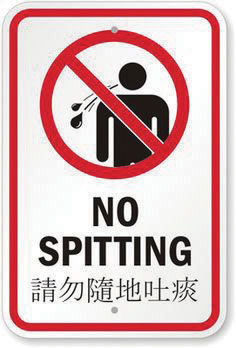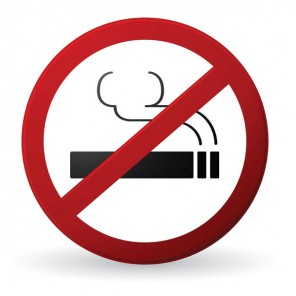By Maria Yang, Lillian Zheng

 Table Manners
Table MannersThough Chinese often boast of their long-standing cuisine culture, U.S. dining etiquette should also be correctly observed. Proper table manners are expected in the fine dining environment.
Give some attention to the cleanliness of the table, and avoid messy plates. It is considered a courtesy to eat quietly. When eating soup, you are expected to use a spoon with the soup bowl that stays placed on the table instead of being lifting. If food or utensils are beyond your reach, it is advisable to politely ask others to pass it to you. When you have a mouthful of food, it is seen as bad table manners to talk. Also remember to carry the food to your mouth with a utensil, rather than bending forward toward the food.

Cleaning or picking your teeth at the table is a bit distasteful. If necessary, excuse yourself from the table and go to the restroom to clean your teeth. To indicate you have finished the meal, place the silverware overlapping one another on the plate, with the fork tines turned upward and the knife facing inward in the upper right-hand of the plate. Seeing the position of your silverware, the waiter will remove your plate.
Talking too loudly, burping, clearing the phlegm in your throat or clearing your throat are considered improper. Gestures have different meanings for different cultures. If, for instance, a burp is coming, you are supposed to stifle it or excuse yourself. One friend of mine working at the reception desk of a hotel, told me about the annoying behavior of some Chinese tourists. They arrived to check in immediately after their lunch and burped rudely with their mouths uncovered. Although this after-meal behavior is found in some parts of China, it is not acceptable in the West.
 How to Dress
How to DressClothing can reflect how well one integrates into a foreign culture. In an egalitarian society like the U.S., there is little distinction between social classes. While business attire is expected in the office, outside the office people from all classes may prefer simple, comfortable clothing styles that have some individualized features. However, simple clothing does not equal careless clothing, nor does it mean an untidy or messy appearance.
Your clothing should be neat and clean. During a visit to an American family, it is a courtesy to take off your hat and coat when you enter the house. Remove sunglasses when indoors, or you may be considered a shady character. Applying or re-applying make-up in public should be avoided. Also it is better not to wear black leather skirts or clothes made from exotic animal fur because this type of dress tends to be associated with prostitutes.

Many Westerners are enthusiastic about recycling and reusing materials. Almost all of American society considers it unacceptable to litter the streets. Recyclable materials include newspapers, bottles and all kinds of paper containers. Being aware of environmental protection efforts, for example, American families pay great attention to home recycling, sorting their trash into recyclable and non-recyclable material.

Smoking is never allowed on planes or trains, though some places may have designated smoking areas. If unsure whether smoking is allowed, you may inquire by saying, “Is smoking allowed?” or “Do you mind if I smoke?”

The level of gratuities differs depending on the region and personal preferences; on average it is about 15% to 25% of the total bill. If four to six dine together, an 18% to 20% tip is often included in the bill. Guests can also leave an extra tip. It is considered rude to give no tip or a low tip.
To integrate into a foreign culture, immigrants and visitors should make an effort to behave in accordance with local social etiquette. You should do your best get rid of undesirable habits, and have a better understanding and respect for a foreign culture. This way, you’ll be able to take full advantage of the new environment.
With 5,000 years of civilization, China used to be a country of etiquette and ceremonies. To regulate our behavior, our ancestors passed down “the three hundred rules of ceremony, and the three thousand rules of demeanor.” Parents should instruct children in the rules of etiquette, and set specific rules for their demeanor. Left with amazing cultural heritages from our ancestors, we should also glorify them in a foreign land.










Cancel anytime


Using our website
You may use the The Middle Land website subject to the Terms and Conditions set out on this page. Visit this page regularly to check the latest Terms and Conditions. Access and use of this site constitutes your acceptance of the Terms and Conditions in-force at the time of use.
Intellectual property
Names, images and logos displayed on this site that identify The Middle Land are the intellectual property of New San Cai Inc. Copying any of this material is not permitted without prior written approval from the owner of the relevant intellectual property rights.
Requests for such approval should be directed to the competition committee.
Please provide details of your intended use of the relevant material and include your contact details including name, address, telephone number, fax number and email.
Linking policy
You do not have to ask permission to link directly to pages hosted on this website. However, we do not permit our pages to be loaded directly into frames on your website. Our pages must load into the user’s entire window.
The Middle Land is not responsible for the contents or reliability of any site to which it is hyperlinked and does not necessarily endorse the views expressed within them. Linking to or from this site should not be taken as endorsement of any kind. We cannot guarantee that these links will work all the time and have no control over the availability of the linked pages.
Submissions
All information, data, text, graphics or any other materials whatsoever uploaded or transmitted by you is your sole responsibility. This means that you are entirely responsible for all content you upload, post, email or otherwise transmit to the The Middle Land website.
Virus protection
We make every effort to check and test material at all stages of production. It is always recommended to run an anti-virus program on all material downloaded from the Internet. We cannot accept any responsibility for any loss, disruption or damage to your data or computer system, which may occur while using material derived from this website.
Disclaimer
The website is provided ‘as is’, without any representation or endorsement made, and without warranty of any kind whether express or implied.
Your use of any information or materials on this website is entirely at your own risk, for which we shall not be liable. It is your responsibility to ensure any products, services or information available through this website meet your specific requirements.
We do not warrant the operation of this site will be uninterrupted or error free, that defects will be corrected, or that this site or the server that makes it available are free of viruses or represent the full functionality, accuracy and reliability of the materials. In no event will we be liable for any loss or damage including, without limitation, loss of profits, indirect or consequential loss or damage, or any loss or damages whatsoever arising from the use, or loss of data, arising out of – or in connection with – the use of this website.
Last Updated: September 11, 2024
New San Cai Inc. (hereinafter “The Middle Land,” “we,” “us,” or “our”) owns and operates www.themiddleland.com, its affiliated websites and applications (our “Sites”), and provides related products, services, newsletters, and other offerings (together with the Sites, our “Services”) to art lovers and visitors around the world.
This Privacy Policy (the “Policy”) is intended to provide you with information on how we collect, use, and share your personal data. We process personal data from visitors of our Sites, users of our Services, readers or bloggers (collectively, “you” or “your”). Personal data is any information about you. This Policy also describes your choices regarding use, access, and correction of your personal information.
If after reading this Policy you have additional questions or would like further information, please email at middleland@protonmail.com.
PERSONAL DATA WE COLLECT AND HOW WE USE IT
We collect and process personal data only for lawful reasons, such as our legitimate business interests, your consent, or to fulfill our legal or contractual obligations.
Information You Provide to Us
Most of the information Join Talents collects is provided by you voluntarily while using our Services. We do not request highly sensitive data, such as health or medical information, racial or ethnic origin, political opinions, religious or philosophical beliefs, trade union membership, etc. and we ask that you refrain from sending us any such information.
Here are the types of personal data that you voluntarily provide to us:
As a registered users or customers, you may ask us to review or retrieve emails sent to your business. We will access these emails to provide these services for you.
We use the personal data you provide to us for the following business purposes:
Information Obtained from Third-Party Sources
We collect and publish biographical and other information about users, which we use to promote the articles and our bloggers who use our sites. If you provide personal information about others, or if others give us your information, we will only use that information for the specific reason for which it was provided.
Information We Collect by Automated Means
Log Files
The site uses your IP address to help diagnose server problems, and to administer our website. We use your IP addresses to analyze trends and gather broad demographic information for aggregate use.
Every time you access our Site, some data is temporarily stored and processed in a log file, such as your IP addresses, the browser types, the operating systems, the recalled page, or the date and time of the recall. This data is only evaluated for statistical purposes, such as to help us diagnose problems with our servers, to administer our sites, or to improve our Services.
Do Not Track
Your browser or device may include “Do Not Track” functionality. Our information collection and disclosure practices, and the choices that we provide to customers, will continue to operate as described in this Privacy Policy, whether or not a “Do Not Track” signal is received.
HOW WE SHARE YOUR INFORMATION
We may share your personal data with third parties only in the ways that are described in this Privacy Policy. We do not sell, rent, or lease your personal data to third parties, and We does not transfer your personal data to third parties for their direct marketing purposes.
We may share your personal data with third parties as follows:
There may be other instances where we share your personal data with third parties based on your consent.
HOW WE STORE AND SECURE YOUR INFORMATION
We retain your information for as long as your account is active or as needed to provide you Services. If you wish to cancel your account, please contact us middleland@protonmail.com. We will retain and use your personal data as necessary to comply with legal obligations, resolve disputes, and enforce our agreements.
All you and our data are stored in the server in the United States, we do not sales or transfer your personal data to the third party. All information you provide is stored on a secure server, and we generally accepted industry standards to protect the personal data we process both during transmission and once received.
YOUR RIGHTS/OPT OUT
You may correct, update, amend, delete/remove, or deactivate your account and personal data by making the change on your Blog on www.themiddleland.com or by emailing middleland@protonmail.com. We will respond to your request within a reasonable timeframe.
You may choose to stop receiving Join Talents newsletters or marketing emails at any time by following the unsubscribe instructions included in those communications, or you can email us at middleland@protonmail.com
LINKS TO OTHER WEBSITES
The Middle Land include links to other websites whose privacy practices may differ from that of ours. If you submit personal data to any of those sites, your information is governed by their privacy statements. We encourage you to carefully read the Privacy Policy of any website you visit.
NOTE TO PARENTS OR GUARDIANS
Our Services are not intended for use by children, and we do not knowingly or intentionally solicit data from or market to children under the age of 18. We reserve the right to delete the child’s information and the child’s registration on the Sites.
PRIVACY POLICY CHANGES
We may update this Privacy Policy to reflect changes to our personal data processing practices. If any material changes are made, we will notify you on the Sites prior to the change becoming effective. You are encouraged to periodically review this Policy.
HOW TO CONTACT US
If you have any questions about our Privacy Policy, please email middleland@protonmail.com
The Michelin brothers created the guide, which included information like maps, car mechanics listings, hotels and petrol stations across France to spur demand.
The guide began to award stars to fine dining restaurants in 1926.
At first, they offered just one star, the concept was expanded in 1931 to include one, two and three stars. One star establishments represent a “very good restaurant in its category”. Two honour “excellent cooking, worth a detour” and three reward “exceptional cuisine, worth a
Thank you for your participation,
please Log in or Sign up to Vote

123Sign in to your account